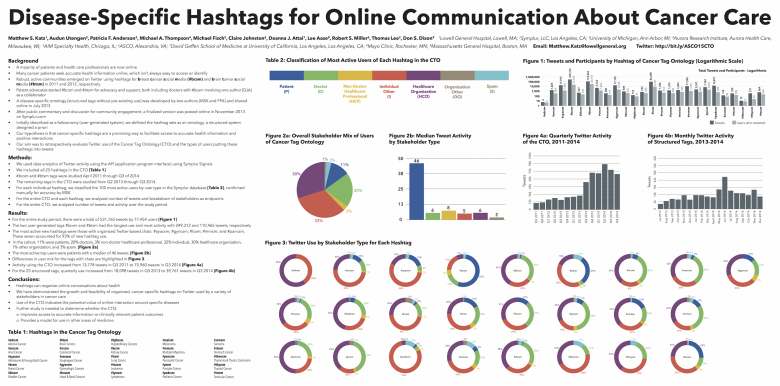Update: The research has now been published in JAMA Oncology
Katz MS, Utengen A, Anderson PF, et al. Disease-Specific Hashtags for Online Communication About Cancer Care. JAMA Oncol. Published online November 05, 2015. doi:10.1001/jamaoncol.2015.3960.
People deserve access to safe, reliable health information online. Doctors have an ethical obligation to help make the internet easier and safer. Will health hashtags help or not?
On June 1st, I presented data on the growing use of the Cancer Tag Ontology (CTO) at the American Society of Clinical Oncology’s annual meeting. Here is the poster:

Analyzing 531,765 tweets from over 70,000 users through December 2014, we found that CTO use is increasing. 93% still come from tags with active chats. We didn’t do any formal statistical analysis, but it’s interesting to see how each tag has different stakeholders using them. The full poster is viewable and downloadable on Slideshare.
At the meeting, ASCO attendees from all backgrounds expressed interest and came to the poster: patients, advocacy organizations, doctors, industry. Beyond the scope of the study, I learned more from discussion with Symplur: as of early May, 62% of NCCN-designated cancer centers have used CTO tags at least 25 times. The five biggest users: Dana-Farber Cancer Institute, MD Anderson Cancer Center, Lurie Comprehensive Cancer Center, Memorial Sloan-Kettering Cancer Center, and UCSF Medical Center.
Despite the great response, we need more research on whether hashtags help. Originally, I focused on creating meaning and community-building by patients and advocates. Collaboration with doctors like Deanna Attai has worked great for #bcsm, but #pancsm was started by doctors. It has been active and useful, just different. What will work best?
When doctors and hospitals use disease-specific tags to share reliable health information online, patients can ‘tune in’ to an interactive radio station. You can listen, get information, or find others people with the same problem for support. The internet doesn’t have to be the ‘Wild West’ if we adopt standards that people value. That will require people, not organizations, using to provide some community immunity, defining what works and doesn’t. And more use will create new challenges.
In this study, we show that cancer hashtags can organize conversations on Twitter. Thousands of patients, doctors, nurses and institutions have found it worth using. We need more research to know if this system really helps patients, caregivers, and providers.
If this system works for cancer, something similar may help organize health online for other diseases. I have my own opinions. But more important than opinions are better data.
What do you think will work?

One Response to “Hashtags to Access Health Information”
Mark Story
Matt,
Great piece and congratulations on the wildly popular ASCO poster.
My take is that people like Deanna Attai and many others have blazed a trail first, to make it ok to talk about one’s cancer in a public setting (was NOT the case in years past), second, to organize people around a particular disease set so that there is almost a built-in support system, information-sharing and camaraderie, and finally, to do what is increasingly happening: widen the Twitter-based connections not just amongst patients, but now among doctors, scientists, caregivers, researchers and more. The communities are growing and becoming more diverse – and that is a very good thing. Heck, a couple of weeks ago, Dr. Jack West conducted a highly scientific Twitter chat with the #LCSM community about lung cancer and immunotherapy (https://twitter.com/lcsmchat). I saw a lot of doctors talking with other doctors, and this was a sea change in my eyes in terms of validating that you could, in fact, communicate about complex medical topics in 140 characters.
I have done a fair amount of Twitter chats, and thanks to tools like Storify, I am seeing hashtags be used for more than just chats as well. Many highlights from AACR and ASCO were Storified and available for those who were interested to look back at highlights without combing through thousands upon thousands of tweets. It’s a great way to just *track* something online.
Finally (opinion only), I am seeing Twitter increasingly drive news and information. Twitter is where many (mainly online) journalists increasingly get ideas for stories. So the nexus of many conversations about cancer, for example, can begin on Twitter, lead to community thought leaders like Deanna Attai or Alicia Staley blogging conversations stemming from Twitter, and ultimately result in more print coverage. When the information in accurate, this is a very good thing for patient communities.
At a time in which more than seven out of 10 people look for health-related information on the Internet, I believe it’s only a matter of time before Twitter becomes part and parcel of science communication. I see it coming (but heck, I’m biased).